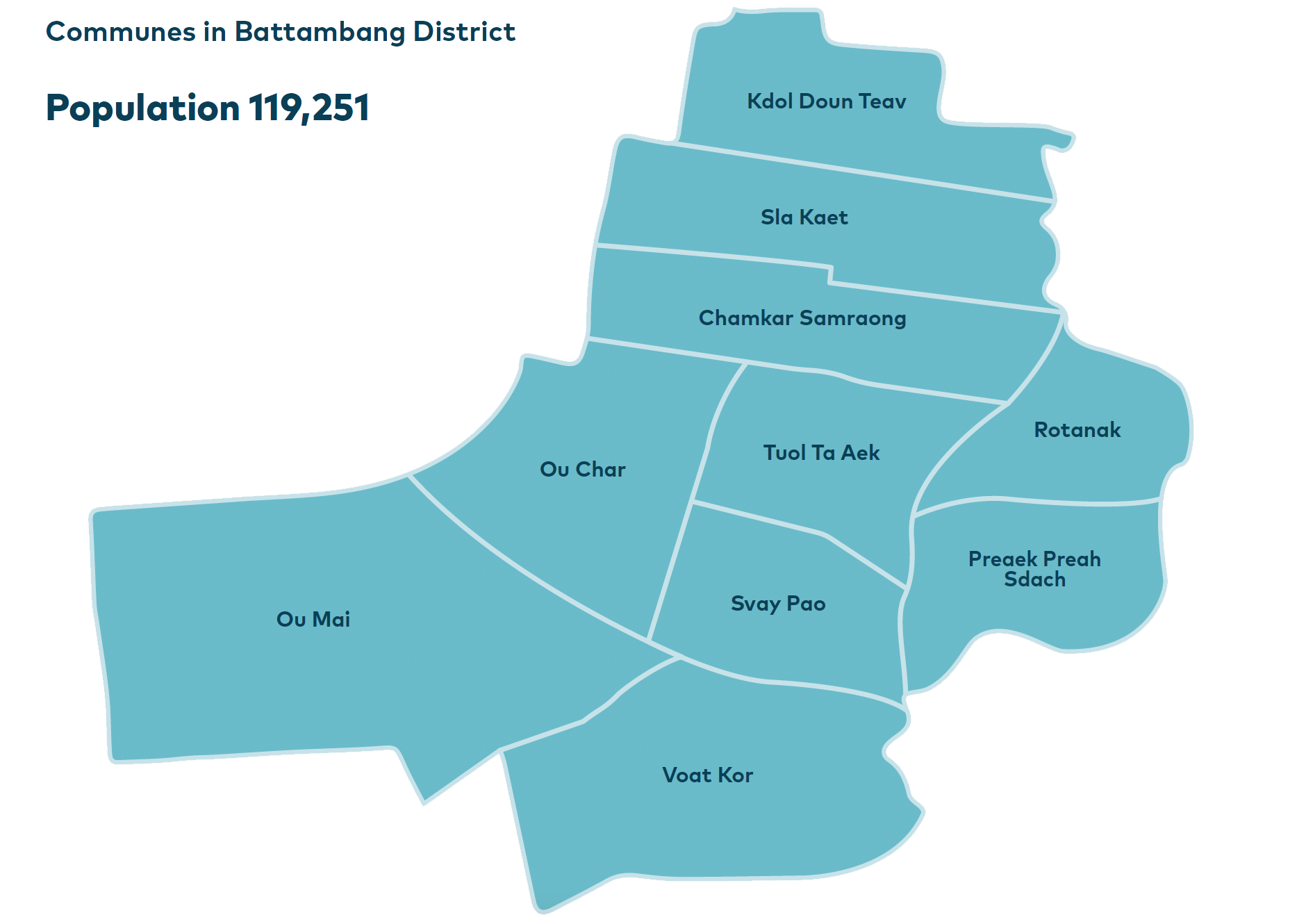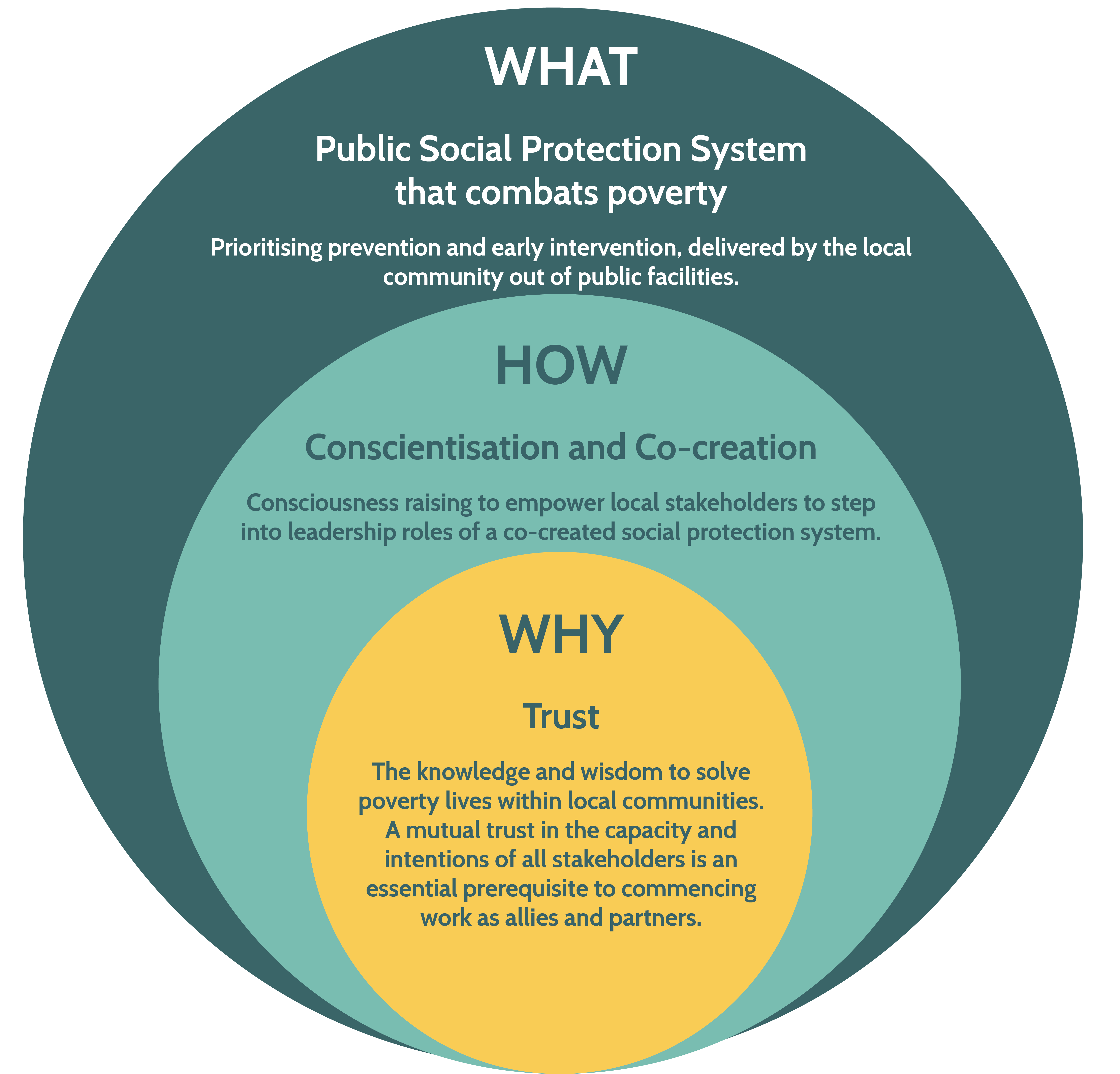
We are striving towards a goal that so few organisations ever achieve – lasting systemic change and our own redundancy.
We are working towards building a public social protection system called the Village Hive in all ten communes and 62 villages in Battambang District that is owned and operated by the local council.
The Village Hive is being built through collaborative co-creation with each commune. All the services that CCT had been operating privately, along with the institutional knowledge developed since 2007, are being integrated into the public sector. CCT staff are being transferred to join the public sector workforce.
The first Village Hive was established in 2022 in Ou Char Commune. In 2023, the second Village Hive was established in Svay Pao commune. We aim to continue to establish one Village Hive per year until we achieve our goal.
With ten communes in Battambang District, we are set to complete the Village Hive Project and the transfer of all CCT services to the public sector by 2032.
Longitudinal research is being conducted across the entire lifespan of the Village Hive Project to create an evidence base that will support the Cambodian government in scaling into other districts across Cambodia.
After 2032, there will no longer be a need for CCT to deliver essential services in Battambang.

Academics from Universities in Australia have been engaged to help develop the evidence base for the Village Hive.
Dr Freda Hui Truscott from the University of Wollongong is completing the research on The Village Hive and will publish the findings in 2024. The title of the research paper is “Putting power in the hands of local communities: Evaluating the effectiveness of community-led social protection systems in Cambodia.”
Dr Bhanu Bhatia from Charles Darwin University is completing research on the Village Hive to evaluate the effectiveness, efficiency and scalability of community-led social protection systems and provide a longitudinal analysis of the impact the Village Hive has had on communities.
Dr Freya Higgins-Desbiolles from the University of South Australia published an academic paper on “Decolonising tourism and development: From orphanage tourism to community empowerment in Cambodia”. This paper used CCT as a case study in sustainable development.
Upstream development recognises the ancestral and cultural wisdom that local leaders hold, which allows them to draw on intuitive ‘knowing’ to find innovative solutions to problems in their community. These leaders share the same lived experience as their communities, providing contextual knowledge that can only be acquired by living through it. They also have deep, trusting connections within their communities and are a powerful source for change if empowered with the appropriate resources.
To support local leaders to step into their rightful roles as leaders of the Village Hive Project we have drawn on the practice of conscientisation, which comes from the work of Brazilian educator and philosopher Paulo Freire. It involves raising critical consciousness about issues of power, privilege and oppression to change social norms and societal mindsets around the role of charities in community development.
Local leaders utilise a process of co-creation to work in solidarity with the wider community to inform every stage of the Village Hive Project design, execution and evolution. Co-creating the Village Hive has led to community-wide investment and ownership that ensures the sustainability of the project and promotes high-quality service delivery.

The Village Hive Project offers a unique opportunity to address the issue of systemic corruption. It is not an issue that is unique to Cambodia or countries in the Global South, but it is nevertheless an obstacle to overcome.
We believe that the issue of corruption will never be resolved if charities continue to circumvent it by maintaining control of a privatised social protection system. The issue of institutional corruption can be managed by developing transparent systems to build trust.
The Village Hive Project has been built on a foundation of anti-corruption frameworks. Before launching the very first Village Hive, we worked with local leadership to co-create zero-tolerance anti-corruption policies and protocols.
The checks and balances in place to account for every dollar spent include the implementation of financial controls such as segregation of duties, dual signatories, audit trails, separation of bank accounts and a ledger system. Budget workshops, audits, monthly reconciliations, spot checks and ongoing coaching and training in fiscal management are also part of the anti-corruption framework.
CCT’s M&E and communications teams ride along with the public workforce of social workers, nurses and teachers every week to capture the data and stories essential to building a robust evidence base. This activity also provides another level of transparency and visibility into the Village Hive operations.
The local leaders have built these anti-corruption measures into the Village Hive because they understand that the success of the project resides in cultivating global networks of radical trust and openness to welcome the idea that local people are more than capable of rising to the challenge of transforming their own world.